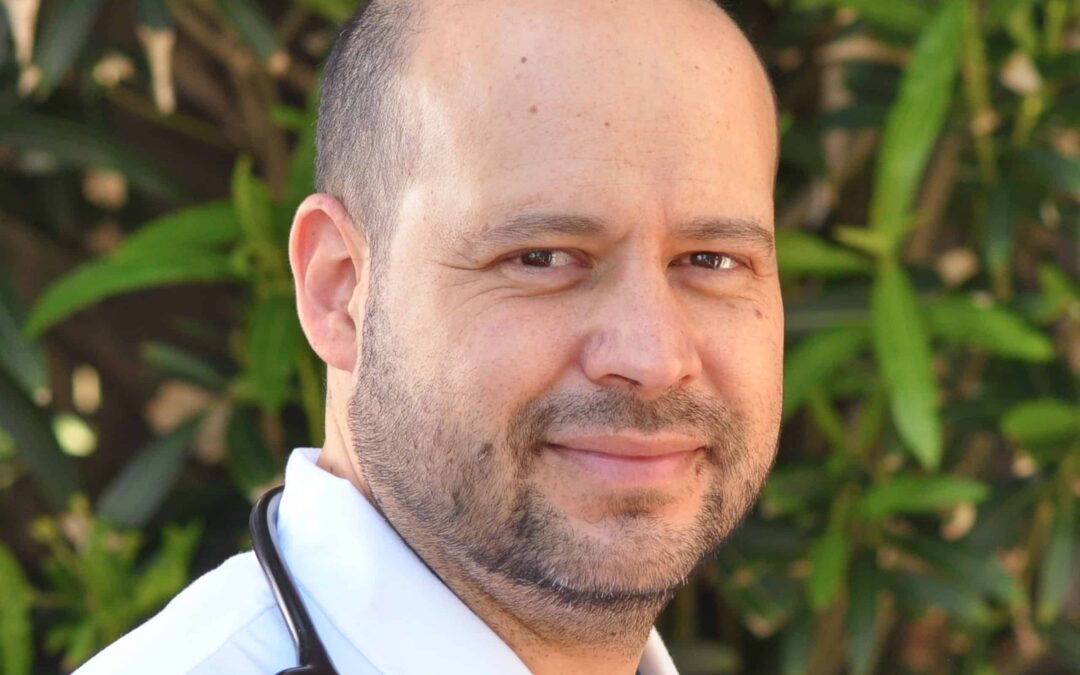Dr. Ortega is truly a unique oncologist here at Sanoviv. I’ve had the pleasure of working near his desk for a few years now, and I often overhear his phone calls with potential cancer patients. I am generally intrigued by his responses to their questions, and now I have my own questions. Besides being very knowledgeable, I also notice his calm and straightforward demeanor. He can put patients at ease, allowing them to make informed decisions about cancer treatment. But, because Dr. Ortega is always so busy, I rarely get a chance just to sit and talk with him. So, I scheduled an appointment to learn more about cancer care at Sanoviv. My visit with him was a learning experience I’m now sharing with you.
Q: Why did you decide to become an oncologist?
A: One of the main reasons I chose oncology is because of the challenging aspect of treating cancer. Many chronic diseases already have treatments and less room for new investigation. As cancer becomes more prevalent, there are a lot of unknowns and so much to be learned. Good research, the right diagnostic tools, and different integrative therapies play a very important role. This translates to increasing a person’s lifespan and quality of life. I love this challenge. It’s my passion.
Immunotherapy for Cancer
Q: Are there any new therapies we do here at Sanoviv for cancer?
A: There are many new therapies. Here at Sanoviv, we’ve been using immunotherapy. These different types of immune cell therapies have a bigger role in cancer than any other treatment. As we do more research, we learn that cancer cells can constantly suppress the body’s immune response. So, therapies that help our immune system are becoming a priority. And because we are manipulating the patient’s own immune system, there is no toxicity or healthy tissues (like with chemotherapy).
Q: What is the process of creating an immune therapy?
A: Here at Sanoviv, the researchers in our immunology department are constantly working on new immune therapies that we are just starting to apply. Depending on the case, we apply some intravenously, subcutaneously (under the skin), or directly to the tumor area.
First, we take a blood sample from the patient. In some cases, this may require a biopsy of the tumor area. Then, we make a specific immune therapy for the patient using their own sample. One example of an immune therapy is dendritic cell therapy. Another example is when we use another subset of cells, natural killer cells and T-lymphocytes. The idea is to provide the therapy and let the body take over.
Q: Can you combine immune therapies with other treatments?
A: At Sanoviv, we can combine immune therapies with other treatments to support the body optimally. So, depending on the case, if we combine immune therapy with chemotherapy, we can use a much lower dose of the chemo drug than the standard application. A good example of why this works is when we combine chemotherapy with hyperthermia (heating the body, like a fever).
Hyperthermia
Hyperthermia increases the absorption of the chemo drug in the tumor area. Studies show that chemotherapy drugs are attracted to areas where there is more heat, which increases the deposit of medication into the tumor area and not in the healthy tissues (like bone marrow, where most of the toxicity occurs). So, we can use a lower dose of the chemo drug and have the same or better effect on the cancer with fewer unpleasant side effects. We can also combine vitamin C and other supportive therapies in the process. Combined with the rest of the cancer care program, they complement each other very well.
Lifestyle for Cancer Care and Prevention
Q: What lifestyle factors do you think are important for healing cancer and for prevention?
A: Nutrition is one of the most important lifestyle factors. Poor diet promotes an inflammatory environment, which can lead to more abnormal cell division and a greater risk of developing cancer. Obesity can increase cancer risk due to higher hormone production in both men and women. I believe exercise, nutrition, meditation, and restful sleep are the four pillars of a healthy lifestyle. At Sanoviv, we address all lifestyle factors and everything else that can lead to chronic disease.
Q: Do you think emotions play a role in cancer?
A: Definitely, and now we have science to support it. Many studies show that negative emotions, chronic stress, and unresolved trauma play an important role in what we call “cell signaling” (messages that our cells receive), which can change cell function. What’s great about cancer care at Sanoviv is that the psychology and mind-body departments are here to help people on their healing journey and often provide guidance for forgiveness, life purpose, and inner wisdom. They also help relieve stress, chaos, and emotional trauma, which is an essential part of health.
Make Informed Choices for Cancer Care
Q: Do you believe it’s important for a person who is newly diagnosed with cancer to come to Sanoviv as a first step?
A: Coming here first after a diagnosis is a good choice and will work tremendously in a person’s favor. It’s a great place to process and understand the diagnosis, get another opinion, and be in a better position to make informed choices about cancer treatment. Again, combining treatments may create a better outcome since cancer cells can become resistant to one treatment approach. When patients come here at an earlier stage, the responses can be much better. We can also help patients have a higher percentage of disease-free life after treatment. This is really important because it’s essential that they maintain a healthy condition long term.
Q: I notice you talk to many patients on the phone before they decide to come to Sanoviv. I also noticed that you are calm and never pressure them to come ASAP, as many oncologists do. Can you comment on that?
A: With some patients, we discuss everything about their disease, as well as their families and lives. I want them to make informed choices and feel comfortable. I am always honest with our potential guests and let them know if I think we can help them. In so many cases, we do, and that’s exciting to see. Again, this is my passion. I love what I do, and I love helping people.
I want to thank Dr. Ortega for teaching me (and now you) more about the Sanoviv Cancer Treatment program.

